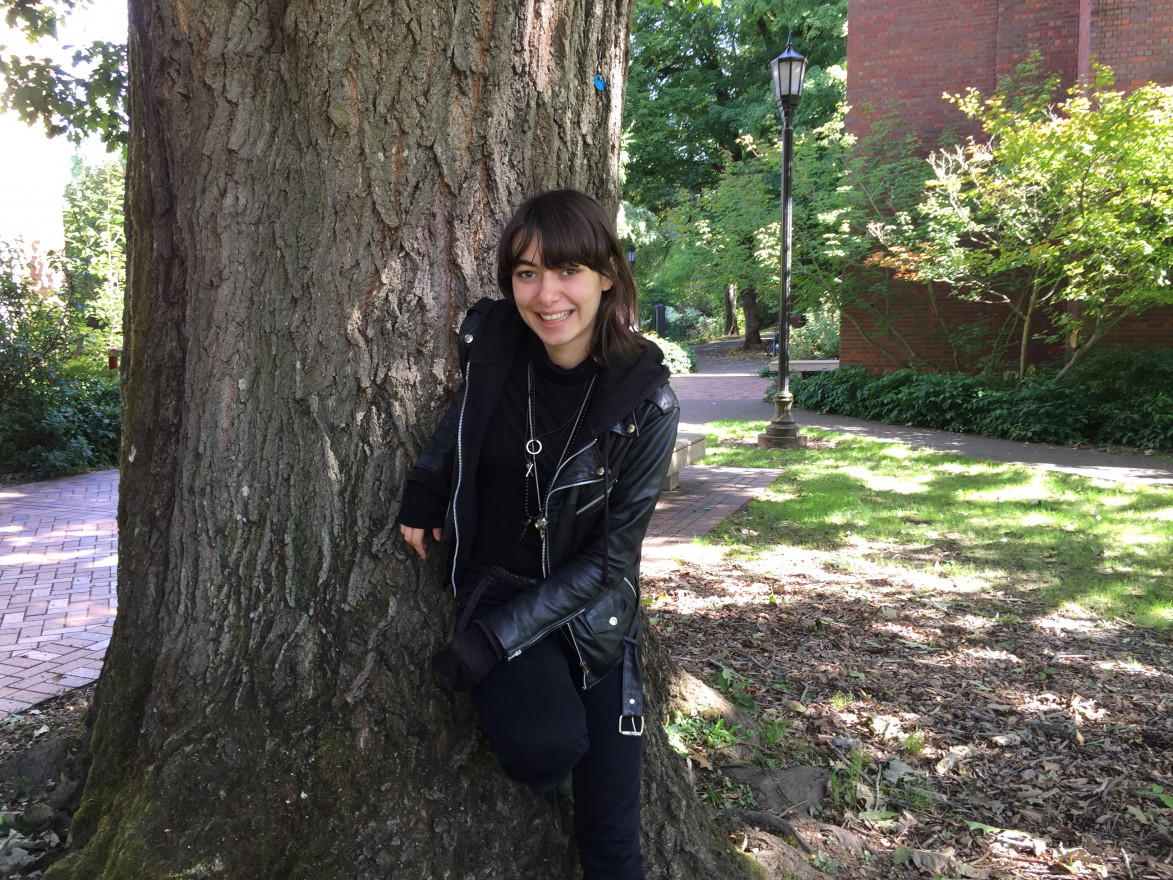
Student activist Giselle Herzfeld (Mahalia Dryak/Reed College)

Student activist Giselle Herzfeld (Mahalia Dryak/Reed College)
I recently had the opportunity to sit down with 22-year-old Giselle Herzfeld and chat about the Global Climate Strike movement. Picture a bright sunny day, a rare occurrence for Portland, Oregon, with fall colors just beginning to turn and a crisp, but refreshing, breeze in the air. Herzfeld catches your eye with her all-black attire, leather jacket, and combat boots. Once you get to talking with her, you will notice her cautious smile, light energy, and passionate personality.
Herzfeld initially got involved in the 2019 Global Climate Strike scene through her internship work at 350 Colorado. 350 is an international grassroots organizing group that tackles climate issues. After developing skills with 350 Colorado and collaborating with 350PDX, the Portland, Oregon, branch of 350, Herzfeld played an instrumental role in getting Reed College students to attend the Portland Climate March. Her objective: get as many Reed College Community members as possible to participate in the Climate Strike and show up to the Climate March.
Herzfeld spearheaded a petition that circulated Reed’s campus and called for the college president to shut down the school in recognition of the climate strike. She, along with other students, managed to obtain 676 signatures, equivalent to nearly half of the students currently enrolled at Reed College, in support of the petition. Other organizing that occurred in the weeks leading up to the event included plastering the campus in posters, coordinating transportation to the strike, and banner and poster making for the march itself, among other logistical details to make the day of the march smooth sailing.
Herzfeld felt compelled to join the movement and help organize due to her increasing anxiety about climate change.
“I was going to school and learning about all the problems in the world—politically and economically and environmentally. And I was learning about all these problems but I was so busy with school that I wasn’t doing anything. So I was locked in on-campus learning things that were making me extremely depressed and terrified, with no outlet and no time to actually do anything about it. So over the course of last semester, I got increasingly anxious and [was] just in a really, really bad place–to the point where there was one night that I had like a six-hour panic attack,” Herzfeld said.
Herzfeld took all this energy and applied to the influential 350 Colorado internship the day following her panic attack. Speaking up and helping out really was not a choice for Herzfeld; it was an obligation.
“We don’t have time, we have to,” she said. “This is a moral responsibility. This is the future of the planet. What else is there to fight for? You know?”
The organizing does not end with the end of the climate march for Herzfeld.
“I’m really excited about the future. I’m honestly finding it really hard to even concentrate on schoolwork at this point because all I want to do all the time is just organize,” she said.
She plans on connecting all the colleges in Portland to create a coalition of environmental organizers to try and organize and share ideas and resources. She wants it to become “the cool thing for colleges to do—declare a climate emergency,” in hopes that their statuses as institutions can help influence the climate change conversation to get some much-needed change happening.
The climate strike not only brought newcomers to the movement, but it also inspired people already informed on the movement to stay involved and motivated.
“After the climate strike I’m a lot more hopeful about the future of the world than I was before the climate strike,” Herzfeld shared. “I feel like there’s a global revolution/renaissance that’s building and that people all over the world are feeling more connected by this global existential threat that connects us in a way that we’ve never had before. We’ve never had a crisis like this where everyone is to a degree complicit in it in some way. As a planet, we can’t really shift the blame because it’s kind of all of us…We’re all the enemy. But we’re also all able to be a part of the solution.”
When she’s not organizing petitions and protests or studying in her interdisciplinary major of political science, sociology, and economics with a focus on network theory, Herzfeld can be found watching films, painting, and attending metal shows around Portland.
“It’s a good way to get the angry energy out — especially around climate change and politics”
She’s excited to keep organizing however, and she’s excited with what the climate movement will lead to.
“I think that the nature of this problem is going to lead to a really, really awesome global movement that we’ve never seen before,” Herzfeld said. “That’s what I hope. That’s what I believe. And that’s what I’m working towards so I’m really excited to see what happens.”